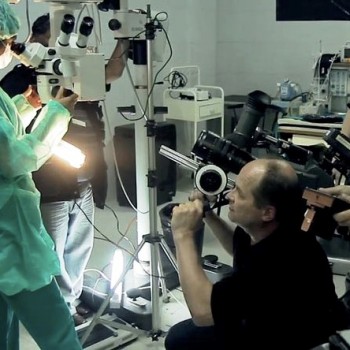Gabor is the main character of the documentary that bears his name, directed by Sebastián Alfie and produced by Minimal Films. In this documentary, Eyes of the world has a prominent role.
Sebas proposed to Gabor, who lost his vision ten years ago, to be the director of photography for a documentary about the project Eyes of the world in Bolivia. The documentary explains how, despite not seeing, Gabor can also participate in a shoot and give precise and perfect directions about the photography of a film. The preparation and filming of the clip, which is the ultimate goal of the documentary, delves into the task of Eyes of the world in Bolivia. The broadcast has received excellent reviews and has been awarded several times: Audience Award and the Best Director Award at the Malaga Festival and the Best Spanish Documentary Award – Canal + Award at Documenta Madrid.
Did you know the Eyes of the world Foundation before participating in the report and subsequent documentary?
No, I did not know it.
After the initial surprise of the proposal of Sebas Alfie, the director of the documentary, of being the cinematographer of our short, what did you think you could contribute to the short film concerning blindness?
At first, I thought that the assignment was a challenge against blindness. Soon this spectrum opened up with enigmas as what it consists of actually seeing or not seeing. And a contribution, in my opinion, is the proof that together we can overcome the unthinkable.
How did you feel becoming the protagonist of this story?
I felt, and I still feel uncomfortable, I am not an example neither for self-improvement nor to point out a path of solution for disabilities. Filming was a conjunctural occasion, a collaboration between many parties and luck.
What were the main difficulties or obstacles that you encountered during the filming and which were the most difficult for you to overcome?
On a personal level, I received a lot of love and support. At the professional level, there was the challenge of transferring and transforming the knowledge of photography to the world of “darkness”. And emotionally, I struggled to insist and keep in mind that darkness is a mental condition and has little to do with the biological.
During the recording in Alto, in Bolivia, you could see the work of the Foundation live. What opinion do you have about our work?
Very good, we have seen an impressive human and technical infrastructure. And the results speak for themselves, people recovering their vision thanks to the work of Eyes of the world.
You have lived in different countries and traveled all over the world, what do you think are the most significant differences in people who suffer from blindness depending on the country where they were born?
It seems to me that in less developed countries, solidarity and resources are restricted to the family core. To combat blindness, it is necessary to involve society on a broader level.
For you, participating in our short film, has been something specific or do you plan to continue working as a cinematographer?
This work has been rather timely. However, I’m still linked to the visual world for my job as a manager of a camera rental company, and I am giving visual appreciation workshops for young people at the El Llindar Foundation in Cornellà de Llobregat.
